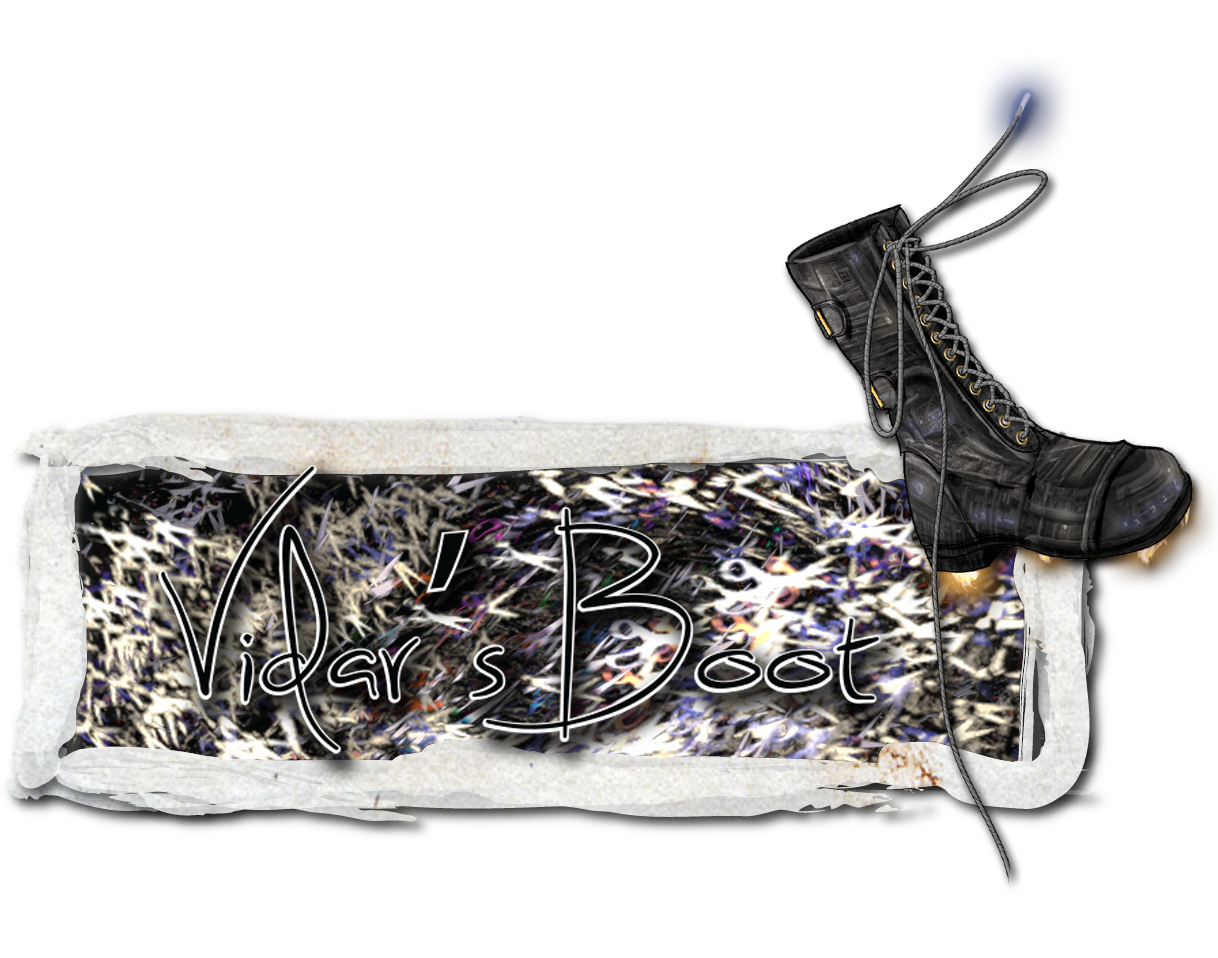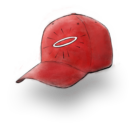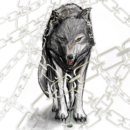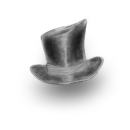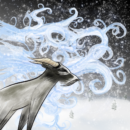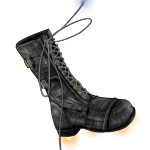– 4 –
Edmund staggers back to his dorm room. He thinks about his hunger.
Saul stands up.
(He was sitting there.)
“You utter dugbuggler, ” he says, and punches Edmund straight in the mouth.
– 5 –
You shouldn’t do this.
I mean, seriously, Saul! What were you thinking? That isn’t the right thing to do at all.
– 6 –
Let’s step back a night or two.
Saul’s in bed. He is dreaming. He is sweating blood; it is rolling in rivulets from his fingertips and his face.
He’s dreaming of a rising river. He’s dreaming of the screaming of the river men: their clawed hands coming up from beneath him; them hooking him, pulling him down.
He dreams of his puppy.
His marvelous, wonderful three-headed puppy, so goofy and so wriggly and so sleek. His puppy that swam in and ate them — three, four, five, six of the folk of the river! — before “Barnface” drank the whole river down.
Then Barnface had gotten sick, and its sneezing had agitated Lake Pepsi, and it was the worst that could possibly happen —
But that isn’t the point.
The point is the soul-aching knowledge that is filling him when he wakes.
“Once I had a puppy,” he says, to St. Peter. “I was a svart-elf, and I had a puppy, but I left. I left it behind and Hans melted the puppy in his pot and turned it into gold.”
“That’s poor parenting,” Peter criticizes.
“They hit it with a nuke,” Saul says. “They fried it to ashes. And they shot it with death rays. And they tied it up. Oh, God.”
He can see it, suddenly, there in the Gulley basement.
The fetter rubs raw on the wolf’s four legs. It cuts it, makes sores rise up, and saws its way — over fourteen hundred years — into the bone. If the wolf were allowed the respite of dismemberment, it would have lost its four feet by now, and its muzzle too; but that, of course, was unacceptable, as this would have let it slip the cord.
Instead it heals, as has healed the titan Prometheus; it heals, like the Ouroboros in the sea.
It is its own vitality, of course, at least in part, that heals it — Edmund has shown echoes of that regeneration, that vitality, by virtue of his connection to the wolf — but also it’s the nature of the cord.
“It’s so cruel,” Saul says.
“I’m sorry,” says Peter. He tilts his head to the side. “Is gout a meaningful hazard here?”
Saul gives him an anguished look. Then he looks confused. Then he shrugs.
“I’m not a doctor,” Saul says. He just has a miraculous blessing that protects people against gout. “I just have a miraculous blessing,” he explains, “that protects people against gout.”
Sorry! That was a little redundant.
“Maybe?” says Saul. But he looks away.
If the wolf has gout it is not the wolf’s biggest problem. Its biggest problem would be that it’s been tied up for fourteen hundred years with an awful cord.
And that’s why St. Saul has hunted Edmund down.
– 7 –
A few minutes ago, anyway, Edmund came back to his room. It’s a small steel room. It’s really more of a prison cell.
The door had been locked and sealed before the Keepers’ House came for him, but it wasn’t the first time. It wasn’t even the second, third, fourth, or seventeenth time.
People are always locking the door to keep him in and piling ever-more-extreme seals and magic chains and such on it, which he dismisses as roguish scampishness or wayward hijinx on the part of the administration when he deigns to notice it at all.
He came back to his room.
Saul was sitting on the bare cot in the middle. He stood up.
Wham!
Right in the mouth.
– 8 –
The reason you’re not supposed to hit Edmund in the mouth is that hitting people is wrong. It is particularly wrong if you’ve been sainted and Tom’s hat holds you to a higher standard. It is doubly particularly wrong if Edmund will just open his mouth really, really wide and take your whole hand in. In fact this is a really good way to lose your hand.
Edmund’s stomach rumbles.
It keeps on rumbling. It rumbles like the sea.
Finally, Saul pulls his hand out. He glares. He turns away.
“Nice self-control, you sodden git.”
Edmund shrugs. Edmund walks past Saul. Edmund sits. Edmund squints up at Saul. “Do I even know you?” he asks.
“I have a band,” Saul says. “Had.”
“I see.”
Edmund catches Saul’s eyes with his. There is a pulse in them; the white in them rises; there is a wave of hunger that should stagger Saul, could separate him from the binding on him that Tom’s hat has lain; but Saul mazes that power as it comes in, skips back from it in his mind, retreats and leaves baffle-concepts in its path, like a man who distracts himself from his impending execution by fretting over the surprise exam paradox.
After a few moments, the pressure of Edmund’s eyes relents.
“I had a wolf,” says Saul.
Edmund frowns at him. “That’s surprisingly common.”
“What?”
“Linus has a black dog,” says Edmund. “Well, it turned white later. Then you blink, and the dog is gone.”
“No,” says Saul. “I mean, it’s yours.”
Edmund tilts his head to one side. Then he sighs. “Would you like tea?” he says.
Saul glances around the room.
“You don’t have a teapot,” he says.
“Ah,” Edmund concedes.
He shrugs. He stretches out on the cot. He sleeps.
“We were going to have an important discussion,” says St. Saul, “about my dreams about wolves and things. They might have been prophetic!”
Or about a previous incarnation.
“Or about past lives!”
But they don’t have that discussion. Edmund is snoring.
“Fine,” says Saul. “I’m leaving.”
But he doesn’t leave.
“I’m making tea,” says Saul, after a while.
But he doesn’t make tea.
“I’m strangling you in your sleep!”
But he doesn’t strangle him in his sleep.
St. Saul finds himself sitting on the edge of the cot and stroking Edmund’s hair. He doesn’t really understand it himself, except maybe, he ran out of other options.
“If we’re reincarnated lovers,” he cautions the world —
After a while, though, it comes to him; he can feel it in Edmund. He can see the puppy wound through and with and in the other boy; it articulates itself through him. The air tastes suddenly of caverns underneath the earth, of wolf dander, and of gold.
Saul doesn’t even understand why he’s crying.
It’s just —
Everything hurts, suddenly, for no reason at all.
After a while he gets up and goes to the door to slip quietly away. He turns the handle. He pulls.
After a further while Edmund wakes up. He looks at Saul.
“I’m a prisoner of my circumstances,” Saul says, embarrassedly. He wipes his cheeks dry.
Edmund rolls his eyes. He gets up. He stretches.
He bursts the seals, he snaps the chains, the touch of his hand shatters the wall of concrete poured out over the door.
Then he blinks, a few times, because he hasn’t had his coffee or his shower yet, and he wanders off.
– 9 –
The svart-elf Eldri visits the home of Mr. Gulley. Finding him out, Eldri lets himself in. He goes down to Mr. Gulley’s basement.
He stares at Fenris for a while.
“My word, ” he says, softly. “You’re almost free.”
“You look like Hell, Eldri,” says the wolf.
“I was nuked,” says Eldri, which is true. There’d been an incident in Bibury. “But I had a shelter. Don’t suppose nuking would do much to you, would it?”
“Feel free,” says Fenris, “to try.”
“I’d like to come closer,” says Eldri. “I’d like to put something on those wounds. Numb them a bit. And take advantage of the opportunity to evaluate the status of the chains.”
“Do it, then,” says Fenris.
“Would you eat me?”
“Eventually,” concedes Fenris.
Eldri scowls. He waves in his ultimate fetch-playing robot. It’s a robot that’s extremely good, at playing fetch. The robot wiggles a finger in front of Fenris’ nose. Fenris follows the finger. Then the robot mimes throwing something.
Fenris lunges. Fenris smacks into the basement wall. Fenris blinks three times, dazed.
The wolf looks back at the robot in betrayal.
The robot has used Fenris’ distraction to scoop up a real ball. It is a fifty-pound sphere of metal. It shakes the ball. It throws it.
Eldri creeps closer.
Fenris eats the robot. Fenris whips its head around to glare at Eldri. Then it hacks. It coughs. The ultimate fetch-playing robot was stuffed to its metal gills with boot leather.
“Gah,” says Fenris. “Gack. Glargh. Gah!”
Fenris is extremely bad at chewing, swallowing, and digesting boot leather. Fenris is extremely bad at spitting things out once they’re in its mouth, throat, or belly. These weaknesses combine — into a single, perfect storm!
“Glack!” whimpers Fenris, combining several previous sounds. Its throat works. Its eyes roll.
Eldri sneaks closer.
Eldri attempts to check on the bonds that hold the wolf.
The wolf snaps at him. It bites down on something like bubblegum. Eldri is prepared. The substance it has bitten into expands in the wolf’s mouth and levers open its jaws until they meet the limits of its muzzling-cord. The wolf has trouble seeing over its wide-stretched muzzle. It squints and wriggles its head, trying to see the dwarf.
It is practically the worst thing the wolf has experienced since Eldri and Brygmir tied it up in the first place, fourteen hundred years before.
It panics. It flails.
And it’s an accident, really, what happens. It’s not really anybody in particular’s fault.
If the wolf had tried it then Eldri would probably have stopped it. The wolf doesn’t try. If the wolf had intended it then Eldri might have read that intention. It doesn’t intend it. It’s too busy panicking over the robot in its throat and the gum in its mouth and its inability to get a good line of sight on the svart-elf smith.
But —
Intent or no, it does it anyway.
It’s scrabbling. It’s retreating, and it’s scrabbling, and it catches Eldri in the lower part of his stomach with one of its great long claws and rakes it upwards and sideways and out it spills his guts.
“Oh, God,” says Eldri.
Blood rushes out.
“Oh, God,” he whispers.
He is not just upset because of his agonizing stomach wound. He is staring at what’s remaining of the wolf’s svart-made silken cord.
He and Brygmir had made it from the footfalls of a cat and the arms of a four-armed ape; the spittle of a bird and the sacredness of death; the torment of the willing and the bearing witness to the wrongness; and the tape that binds an emu; and the perseverance of hope. And at the time it had seemed pretty sturdy.
But now . . .
He can see where the tape of emus has been scissored; where the torment of the willing is rather frayed; that the bird’s spit is so dry it isn’t helping; and the sacredness of death and the perseverance of hope have been swallowed, eaten, and forgotten —
If there were ever such things at all.
Eldri thinks about how to fix this, even though he is dying. He works, even though he has no time left. He tries, so very desperately, to add the fading life of a svart-elf to the structure of the chain but —
A paw comes down on him. It breaks his back. It crushes it.
He dies so fast he’s still trying to do something smith-like for like three whole seconds after he is already gone.
After a while Mr. Gulley comes home and he stands at the top of the stairs. He looks down.
His face is affectless.
Fenris hiccups up a bit of robot, gum, and boot. It sniffs miserably at the resulting scraps. It looks up pleadingly at Mr. Gulley.
“You can’t possibly expect me to clean that up,” says Mr. Gulley.
Fenris noses Eldri’s corpse. It wants to eat it. But it can’t eat it. For the first time in a life of hunger it cannot imagine how it would keep food down.
The wolf hiccups again.
“Who is that, anyway?” Mr. Gulley asks.
“I don’t know. Somebody. You left him out,” says Fenris. “That makes this your fault. You’re not supposed to leave dwarves and robots out around the wolf.”
“Says who?”
“Stands to reason,” argues Fenris.
“Who is he?” says Mr. Gulley. “And — you’re not supposed to kill people. Look at him. He had a life!”
“He was trying to check my cord,” says Fenris.
Mr. Gulley turns off the lights. He stomps away. He slams the door.
After a while he comes back.
He’s holding a loaded shotgun. It’s completely useless, but he points it at the wolf anyway.
“It’s got wolfshot in it,” he says.
Fenris sulks.
“Bad wolf!” says Mr. Gulley, but he can’t make himself fire. Not even to make a point!
“It’s not my fault,” says Fenris. “He was bothering me.”
Mr. Gulley sighs
“I don’t want him to just lay here dead,” says Fenris. “I don’t want to eat his body.”
“You’ll eat my body,” says Mr. Gulley. Then there was a pause. “I mean,” he says. “I mean, you’ve expressed plenty of willingness to kill and eat me. And you ate my Dad.”
Fenris tugs at the cord. The wolf stretches. It leans. Blood oozes out where over fourteen hundred years the cord has left its furrows; there is a gust of sickening stench; but the svart-cord does not budge.
“I don’t want to eat you either,” the wolf says, after a while.
“Wow,” says Mr. Gulley. “Either you’ve gotten better at lying or you’re really sick.”
“I could’ve eaten you any time,” dismisses Fenris.
“Could you?”
“I could’ve,” Fenris says. “But you’re company.”
“Oh.”
“I wanted company,” says Fenris. “I didn’t want to be locked up in the Gulley basement alone for all these last few seasons of my chains.”
“Oh,” says Mr. Gulley.
He lowers the gun.
He sits down. “I’m sorry,” he says, softly.
Fenris licks at Eldri’s corpse a bit. The wolf looks queasy. The wolf sighs, and it turns away.
Mr. Gulley turns the lights back on. He makes sure the kibble bowl is full. He backs away, and he closes the door.
Fenris tugs with a futile irritation against its last several strands of cord.
– 1 –
First there was Edmund, begging for his freedom.
Then there is Emily.
They pass in the halls. Tom sees her eyes. He shudders at what he sees in them.
“I can’t help you!” Tom snaps. He flails a hand in her direction.
He is angry because he feels guilty.
Then he stalks away.
“All of them, ” he mutters. “Everyone. Why? Why can’t people just be happy being whatever my hat turns them into? Why must everything be so complex?”
Tom stalks into Saul.
“You!” he says.
Saul hangs his head.
“You want to be re-hatted, ” he says, “Don’t you.”
“Um,” says Saul.
“You are not satisfied with being one thing,” says Tom. “You would rather be no things, maybe. Or 1*i things. You cannot appreciate what it is that you have.”
Cheryl stops in the halls. She looks at them.
“Stop it,” she says. “Tom, you are having a terrible idea.”
“Bah!” he says. “I can recognize my own bad ideas.”
“But you still do them —”
“I am a prisoner of my circumstances,” Tom concedes.
As it was written, so shall it be.
– 2 –
A notion is filling Tom’s mind. He doesn’t want to do it. It’s a bad idea. He shouldn’t do it.
But he’s almost as bad at resisting as Sid.
– 3 –
Tom drags Saul back to his room.
He shows him the unfinished hammer shaft of science. (This isn’t any kind of euphemism. It’s the shaft of an unfinished hammer. Of science!
It smashes outcomes into the desired configuration.
The outcome-smashing part is actually easy. It’s explaining the desired part that’s hard!)
“May I?” asks Saul.
“If you can.”
Tom watches as Saul heaves at the shaft a few times. Result: failure!
“It’s heavy, ” Saul admits, with a sigh.
“I started thinking, ‘Tom, you’re just going to integrate it into the boot’s systems anyway, you might as well optimize it for a low-G environment.’ But now I can’t lift it at all. It is,” Tom says, and waves his hand in a Tom-wroth gesture, “an unfortunate circumstance; I shall have to construct some sort of hammer-lifting machine when I arrange for its transport up. Also it is very sharp.”
Tom pricks his finger with the tip of the unfinished hammer shaft of science, in demonstration. His finger starts bleeding.
That wasn’t the desired configuration at all!
“Well,” says Saul. “That is beside the point of why I have bumped into you accidentally in the halls.”
“That’s certainly true,” says Tom. “And the answer is no. I refuse. I will not do it. I will not re-hat you. Hatting you once was trouble enough already! I had to use my bees! Besides, there is no point. You are already one thing. You are already the one thing that you are. If wearing the hat again could change that, then I, who has worn it over and over again since the beginning, would already be crawling mutant chaos gibbering and drooling in the void. Or God! But certainly not still just Tom. Look at these human hands. They’re so warm-blooded! You disappoint me, Saul. Surely even a saint can count to two!”
“I was one thing,” says Saul, stubbornly, “but I might have changed to be another.”
“Ridiculous,” says Tom. “If you could change, then you wouldn’t be one thing. That is what it means to be one: to be perfect, and not imperfect. And only the imperfect can evolve. Scissors can evolve and become papers. Papers, into rocks. But we, we wear our hats and we are solitary and we are one thing and we are vast.”
Tom turns away.
He strokes the edge of his marvelous desktop computer monitor in sorrow.
“I liked your music,” he says. “You know. You disappointed me greatly. I still have not forgiven you for choosing to be a saint.”
“I did not choose,” says Saul. “And further, I’m not the same.”
“No?”
“I’ve learned from my experiences,” says Saul. “That which does not change, does not learn. That which does not learn, does not remember. If I were incapable of changing, then I would still believe it to be the night you gave me hat.”
“Ha! A glimmer of intellectual competence,” says Tom. “But, as so often happens, a little reason is a dangerous thing. Saul, you’re not changing.
“You’re a fixed point.
“You do not learn; you do not remember; you are one thing. Memory and learning move to you. The world shows you different faces; you show it different faces; this is as natural as light refracting differently through each of a crystal’s different sides.
“Consider your sainthood as like unto a perspective drawing made in chalk upon the roadway: look from here, it is a perfect image; look from there, it is a distorted and ugly design, but in every case it is the same pattern of chalk upon the road, unchanging, eternal, like a diamond, like the void. That is why I myself may not regret —”
Saul interrupts him with a raised hand.
“I accept it;” Saul says. “It is impossible.”
Tom’s shoulders settle. He looks down.
“I can only hope to blatantly grovel to your superior intellect,” says Saul; “and to pander to your hubris, and pray that you can make the impossible possible; that you can transcend reality with the power of the House of Dreams. That your genius, alone in all this world, can extract me from this inextricable sainthood into which I have made myself entangled.”
“Impossible,” says Tom.
His lower left eyelid twitches, though. He’s always wanted somebody to blatantly grovel to his superior intellect and pander to his hubris in hopes of making the impossible possible, and here it’s one of his ex-favorite musicians.
“It can’t be done,” says Tom. “If it were that easy then the Devil would be doing it to all the saints. If it were that easy then the world wouldn’t need anybody to do science, it would just all align itself like filings on a magnet into the perfect shape.”
Saul looks helplessly at Cheryl.
She considers.
“Nothing,” she concedes, finally, reluctantly, “is impossible for the House of Dreams.”
Tom’s mouth works.
“That’s true,” he says, softly, sadly. “It is not impossible for me. I am Thomas the First. But I mustn’t. I shouldn’t. The very idea is wrong.”
“Pander,” says Saul, attempting to provide a sound effect to an action he is not in any literal fashion performing. “Pander. Pander.”
Tom’s eyelid twitches more. Then he stretches his hands to the sky and gives a hissing, growling outburst-scream.
He spins on Saul. He glares at him.
He points. He lowers his hand. He sighs.
“I will do it,” he says. “You have pandered excessively, yet not so excessively as to disgust me. And you have recruited my sidekick —”
“Rival,” corrects Cheryl.
“Associate?”
Cheryl ponders this. It makes her uncomfortable. “Colleague,” she suggests.
“You have drawn my colleague into assisting you in this madness.”
“He’s hot,” Cheryl concedes.
“He is not ‘hot,’ Cheryl,” says Tom. “Good lord. Look at him.”
They look at him. After a while, Saul says, “I could take off my shirt?”
“Don’t be ridiculous,” snaps Tom. “She is too young. Our — her eyes are too delicate for such perversity.”
He turns away.
“At any rate,” he says, “I am pondering the matter. It seems that I must unfocus you. Set you to blurring. Divide you into a cloud of many forms.”
“Will it hurt?”
“Then,” says Tom, ignoring him, “while you concentrate on making yourself a creature of science — a Lethal student worthy of becoming an associate of my noble House — I will raise the hat above your head, like this!”
Tom poses, raising the hat above Saul’s head.
“You have a cap on under your hat,” says Saul.
“It is so that I may pose dramatically like this without feeling the discomfort of hatlessness,” Tom summarizes.
“I see.”
“And then I will lower the hat,” says Tom, putting his crowning hat back on, “etcetera.”
“Does the hat,” says Saul. “I mean, does the hat, the hat you have on underneath, is it, is it becoming one thing?”
“Hats are not sentient,” says Tom.
“And?”
“You shouldn’t anthropomorphize hats,” says Tom. “That way lies madness. They are not sentient. They are not beings. Therefore, they are one thing already.”
“That has disturbing implications,” says Saul.
“Yes,” concedes Tom. “The dead are one thing. The unliving are one thing. The Keepers are one thing. I am one thing. The implications throng! They haunt my dreams. But they are irrelevant under these circumstances. Stephan!” Tom snaps his fingers. “A crash of thunder, if you please.”
Tom’s roommate opens his mouth. A low boom of thunder rolls forth. He closes it.
“And now,” whispers Tom. “The dissolution.”
He pulls open a drawer, dramatically. Inside are pins. They are mostly dead pins. Some of them are various awards that Tom has accumulated, such as the pins for his various honor societies. Others are stolen, bought, or found. He sifts through them, piles a few of them together, and solders them into a single, greater pin.
“Lo,” he says.
He turns. He holds it out to Saul. Saul takes it, uncomfortably. It has become a single spear of gold.
“Put it on,” hints Tom.
Saul stares at it blankly. He cannot fathom how to put it on.
“It is a pin — oh, for the love of God,” Tom says.
Tom takes the pin back. He tries to clip it to Saul’s shirt. Saul finds himself stepping backwards. He is retreating. His movements are as elegant as a dancer’s. He isn’t even sure why. “What are you doing?” Saul says. His voice is tight, tense. “What is that? Where am I? Why doesn’t anybody enforce discipline at this school? I must not, Tom, this must not —”
“Stephan,” snaps Tom.
Stephan stands up. He grasps Saul’s arms from behind. He pins him. Saul struggles.
“Wait,” Saul says. “Wait. Let’s discuss this. We can negotiate. Please. I retract my consent. Stop, Tom. Please discuss this. I think I am going to hurl.”
“That is discus-ing,” Tom quarrels, and snaps the pin onto Saul’s shirt, right through the skin. Thunder booms to drown out Saul’s unfolding screams.
Tom raises up the hat.
He lowers it.
“It is done,” he says.
He turns away. He pushes the button on his belt that summons his crowning hat back onto him. He does not even watch as Stephan releases Saul, who falls.
“Get him out of here,” says Tom.
“He may be a member of Dreams,” argues Cheryl.
“He may also explode,” says Tom, “irradiating the surrounding countryside with efficacious spiritual toxins.”
“Hm,” Cheryl says. “That would be bad.”
She takes Saul’s wrists. She drags him out into the hall. She pushes him over to the window, folds the double-layered plexiglass out of the way into a Möbius twist, leans him out over the open frame, and she throws Saul down.
“Good luck!” she calls down after him.
He plunges into the rosebushes below.
– 1 –
In Tom’s upside-down Vault of Forbidden Things, there are many things that are forbidden.
There is the shrine to New Kids on the Block. You shouldn’t have one. There is the goat that he’s been sharpening. You definitely shouldn’t have one of those!
There is the cage with his buttered vulture.
There is a machine in Tom’s Vault that is Forbidden; it takes candy from strangers and it swallows its gum.
Tom’s infinitive splitter rises — it is forbidden, in Latin. It slams down. It cuts, to improperly power his lab.
You shouldn’t have things like that, Tom.
That vulture. It’s too slippery!
In the corner is a faux button that cannot be pressed.
Harold had argued with Tom over this, extensively. He’d told him that a button that can’t be pressed represents the very antithesis of reason. Tom had answered, “But if someone were to press it, wouldn’t the consequences be pretty bad?”
He tries to press it anyway, sometimes, in pursuit of one theory or another.
The button is really more of a bit of abstract art, a kind of subtle joie de vivre in a Vault otherwise entirely concerned with wrong things, and so he fails. It isn’t really a button, as buttons are understood, at all.
In the very center of his vault there is a vacuum environment.
In that vacuum a pair of scissors drifts.
They are not alive but they are not dead. Not all the way. They came at Earth but they never quite reached it. He caught them from the sky, held them in magnetic grip, because he had a plan.
“Experiment 58,” says Tom. “Making all that is lost and purposeless, something good.”
– 2 –
This bit’s actually from pretty late. The boot’s in the sky and the scissors are falling. The Fan Hoeng have come and Linus is battling Jeremiah Clean.
The world is this close to Gotterdammerung.
But what is Gotterdammerung, to Tom?
